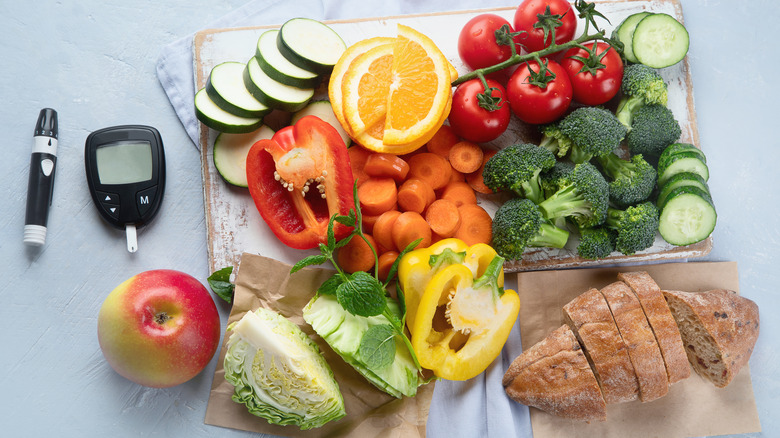Fructose Vs. Glucose: Which Sugar Is Safer For Diabetics?
The fructose vs. glucose debate has been around for decades. Some say that fructose is a better choice than glucose, while others blame it for liver disease, diabetes, and weight gain. Glucose and fructose are both simple sugars, but your body metabolizes them differently. Therefore, each has a different effect on blood sugar levels and overall health. "The body's preferred source of fuel is glucose. Glucose is sourced by breaking down disaccharides or polysaccharides, which are larger sugar molecules," dietician Jamie Feit told Clean Eating. "Meanwhile, fructose is found in its simplest form in fruits and some vegetables like beets, corn, and potatoes."
Glucose occurs naturally in fruits and vegetables, but it's also added to processed foods. After ingestion, it enters your bloodstream and signals the pancreas to release insulin. Next, your cells absorb the glucose in your blood and use it for energy. The excess is stored in the liver and muscles for later use, notes a 2018 research paper published in Nutrition Reviews. When your glycogen stores are full, any excess glucose is converted to fat and stored in adipose tissue. Fructose, on the other hand, is metabolized in the liver and then converted to glycogen or fat, explains the Royal Society of New Zealand.
Both sugars provide energy and occur in a wide range of foods, but which one is safer for diabetics? Let's find out.
Fructose isn't necessarily better than glucose for diabetics
Until recently, fructose was considered a safer option than glucose for people with diabetes. First of all, it creates a more gradual increase in blood sugar levels, states a 2008 review featured in the American Journal of Clinical Nutrition. Second, fructose has a relatively low glycemic index (GI), according to the Sugar Nutrition Resource Centre. Its GI value is 19, whereas glucose has a GI of 100. Low GI foods have a moderate effect on blood sugar.
Despite these aspects, fructose isn't necessarily a good choice for diabetics. This simple sugar may inhibit the secretion of ghrelin, the so-called "hunger hormone," and increase appetite, explains the American Journal of Clinical Nutrition. Moreover, it affects the production of leptin, another hormone that regulates appetite. Animal studies suggest that it may also lead to metabolic syndrome, cataracts, insulin resistance, fatty liver disease, and high blood pressure. As the scientists note, more research is needed to determine its safety.
Both fructose and glucose can be harmful when consumed in excess
An important aspect to consider is that your body cannot make out the difference between naturally occurring and added sugars. "The glucose you find naturally occurring in a grape is going to be the same as the glucose in table sugar," senior research investigator Colleen Tewksbury told SELF. The same goes for fructose and other sugars in whole or processed foods.
This means that if you eat large amounts of honey, grapes, or other foods rich in fructose and glucose, you're not doing yourself any favors. Whole foods are often more nutritious than processed foods, but you still need to watch your portions. The authors of a review published in the Mayo Clinic Proceedings recommend limiting fructose intake to 5% of your daily calories. Realistically speaking, it can be difficult to track the amount of fructose or glucose consumed at every meal. What you can do instead is to clean up your diet and reduce your overall sugar intake.
The American Diabetes Association suggests using low- or no-calorie sweeteners in homemade sauces and desserts (via Clinical Diabetes). Other lifestyle changes, such as swapping cereals for whole grains and cooking your meals at home, can be helpful too. Also, make sure your diet is based on whole foods, such as leafy greens, nuts, and fresh fruit. You would have to eat a few pounds of apples, oranges, or celery to get the same amount of sugar you'd get from a milkshake.


